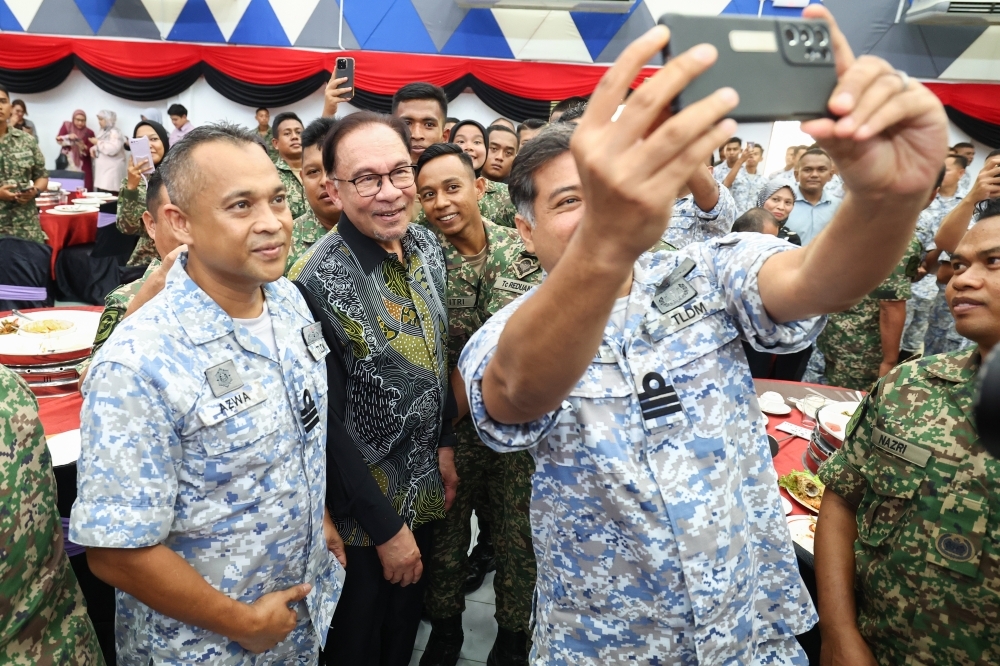Five factors why Anwar is most eligible PM - Research
MOHD FAIZUL HAIKA MAT KHAZI
SHAH ALAM: Political experts have identified five factors why Datuk Seri Anwar Ibrahim is the most suitable individual to become Prime Minister, as reported by research centre Endeavour-MGC.
One of the main factors which drove Anwar's increase in popularity was that he received solid support from more than two-thirds, or 148, of the 222 members of the Dewan Rakyat after the end of the 15th General Election (GE15).
National Professors Council Fellow Dr Jeniri Amir said Anwar was the main choice because the majority of respondents believed he was capable of guaranteeing the country's political and economic stability in the next five years.
Another factor on why people chose the PH Chairman as the most qualified individual to become Prime Minister, he said, was Anwar's seriousness in dealing with issues of corruption, misappropriation of public funds, and misuse of power in government.
Jeniri added that this was good because the country needed a Prime Minister with a positive image in the eyes of the world, especially to attract more foreign investors to invest in Malaysia.
"However, the rakyat also sees that Anwar has still failed to deal with the issue of rising inflation, the cost of living, and the price of daily necessities, even though the government today introduced various measures such as the ‘Menu Rahmah’ programme.
"The increase in the overnight base rate (OPR) is another example that causes the people to be less satisfied with Anwar's administration because it results in them living in a stressful situation due to having to pay higher loan instalments than before," he told Sinar Premium.
Therefore, Jeniri also believed the government needed to show more commitment in dealing with the issue of rising inflation, the cost of living, and the price of goods if it does not want to be rejected by the people in the next state elections.
He further added that although political stability was important, the most important thing in the eyes of the people was whether the Anwar’s administration was able to deal with the issue of rising inflation, the cost of living, and the price of essential goods or not.
"Not only the Domestic Trade and Cost of Living Ministry, but the Economy Ministry's Rafizi Ramli also needs to play a more effective role to help the government find the best formula to deal with the issue of rising inflation, cost of living, and prices of goods hitting the country at this moment.
"This is because when he was in the opposition bloc, Rafizi was not only great at criticising and presenting various formulas to solve the people's problems, but after becoming the Economy Minister, he seemed to lack ideas," he explained.
Icon of political struggle Universiti Sains Malaysia political analyst Professor Dr Sivamurugan Pandian saw Anwar as the most qualified individual to become Prime Minister because of his success in uniting the majority of MPs under a new administration and combined various parties that were once enemies, such as Umno and DAP.
In addition, Sivamurugan added that Anwar was often used as an example and an icon of political struggle by the community at home and abroad.
However, he explained that the results of the study were not a benchmark for the people's support for the party formed as Unity Government in the state elections, but they could be used as a medium for political determination to defend the Federal Government.
"The results of this study cannot be used as a general interpretation of the rakyat’s support for the party that will form the Unity Government in the next state elections because we do not know the date and issues that political parties will play in the next election.
"The three main factors that are often relied upon to evaluate voter behaviour and support patterns include loyalty to the party, the candidate, and issues played during the election," he said.
Not a guarantee Despite winning against the nearest challengers - Pagoh MP Tan Sri Muhyiddin Yassin; Bera MP Datuk Seri Ismail Sabri Yaakob, who ranked third; and former Health Minister Khairy Jamaluddin Abu Bakar, the study cannot be a real measure of voter support for the Unity Government made up of Pakatan Harapan (PH) and Barisan Nasional (BN) in the upcoming state elections.
Universiti Malaysia (UM) political analyst Dr Mohammad Tawfik Yaakub asserted that research data showed that Anwar received support from non-Malay voters proved that there was indeed a 'green wave' or an increase in Malay voter support for the Perikatan Nasional (PN) led by Muhyiddin in the last GE15.
Therefore, he said, Anwar needed to do something extraordinary to win back the support of Malay voters for the PH Chairman's policies and leadership.
"I also see that Umno is now unable to be a fixed deposit or give solid support of the Malays to the government led by Anwar.
"If Umno can really represent the support of the majority of the Malays, then we can see that the percentage of Malays' support will be higher in the study done by the research centre," he added.
Tawfik believed that one of the reasons why the Malays did not support Anwar through the study was because of the Prime Minister's previous heart-wrenching speech, such as 'Muslim Malays in this country are reminded not to be too comfortable and arrogant to the extent of marginalising other groups’, in addition to the issue of Malay reserve land in Perak state.
"Muslim Malays are also still waiting for the rationale and response the Prime Minister will take to deal with the issue of the government's actions and the Home Affairs Ministry (KDN) withdrawing the appeal of the Allah word case in court recently.
"All related issues are very close to Malay Muslims. If it fails to be handled well by the government, maybe the green wave will peak in the state elections later," he stressed.










